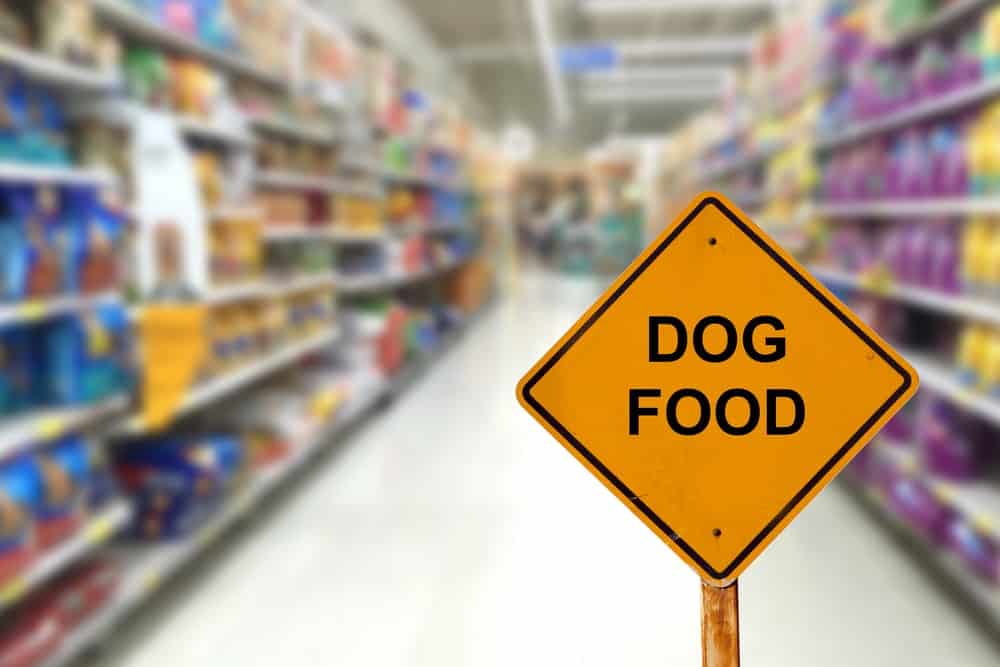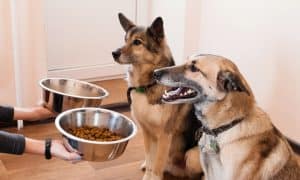“This post contains affiliate links, and I will be compensated if you make a purchase after clicking on my links.”
As with humans, your dog’s health and happiness depend mostly on the type of food you feed them. While you want the best for your canine friend, sometimes choosing the best food for them can be daunting.
This is because there are various commercial dog food options on the market, coupled with the fact that each dog has its own nutritional needs.
Of course, most of these brands advertise themselves as healthy and veterinarian approved, but not all of them are worth their salt.
Knowing what to look for in commercial dog food will help you choose the best food for your canine friend. Read on to learn what to look out for the next time you’re shopping for dog food.

1. Food Ingredients
While this may sound obvious, it’s the first thing you need to check when purchasing dog food. Ideally, you need to choose a dog food that contains real ingredients that you can quickly identify. If you can’t understand what products are contained in given dog food, it’s probably best not to buy that food.
Opt for foods that contain real ingredients like chicken, apples, rice, carrots, etc.
2. Is Your Dog Allergic?
As with humans, dogs can be allergic to chicken and other meats. If that’s the case, you can decide to feed your dog a meatless diet.
However, if you go this route, you need to be careful to ensure you find the balance of fat, protein, carbohydrates, and other nutrients. Instead of feeding your dog a homemade diet, it’s advisable to stick to commercial meatless dog food.
Ultamino dog food for pets with sensitive tummies is an excellent example. It contains vegetable oil, coconut oil, fish oil, vitamins, natural flavors, among others. Canine Ultamino is a complete and balanced dog food that ensures that your dog stays healthy and is well-maintained.
3. Consider the AAFCO Statement
Checking the ingredients contained in commercial dog food is good but not enough. You’ll also need to check the statement on the AAFCO label on the food. Dog food with this label offers a complete and balanced diet for your canine friend.
4. Check the Protein and Fat Levels
As a responsible pet parent, you need to check the amount of protein and fats available in your dog food. Look for this information at the guaranteed analysis box. Doing this will ensure that you don’t give your dog food with excess fat and protein, affecting the quality of their life.
The protein and fat content in each given food will be different. Don’t buy any dog food without checking the protein and fat levels. Some dog foods may contain three or more times as much fat and protein than another brand in the store.
Of course, you need to consider your dog’s age, weight, size, activity level, possible health issues, and general wellbeing when selecting dog food. It’s also imperative that you consider your dog’s past feeding habits before feeding them new dog food.
If you’re unsure about the amount of protein and fat right for your dog, ask your vet to help.
5. Don’t Ignore the Byproducts As Well
Most pet food companies claim that real meat ingredients are better. Although there’s some truth in it, this shouldn’t make you rule out byproducts like bones and organs. Some of these byproducts may be more nutritious than real meat.
Grains contained in some dog foods are also nutritious. Unless your dog has gluten sensitivities, you shouldn’t fear feeding your dog with a commercial diet containing grains.
6. Water
Water is a crucial element in a dog’s diet. Different commercial dog foods come with varying moisture content. Choose a dog food with a high percentage of moisture. However, don’t forget to regularly give your dog fresh water just because water is included in their food.
7. Check the Date Code
Now that you know the ingredients to look in the dog food, it’s time to check where and when the product was made. You will get this information at the date code stamped somewhere on the product.
These codes are essential as they can help you know what to do in case of any food problem. However, since this information is coded, you can’t quickly determine what company manufactured the food. If you have any problem with the food, bring the date code to the pet food company, and they will help you.
Another critical part of the batch code is the date of manufacture or best by date. Be sure to check these codes to confirm that dog food has not lost its nutritional value.
Related: Choosing the Right Dog Food Bowl (Yes, It Matters!)


















